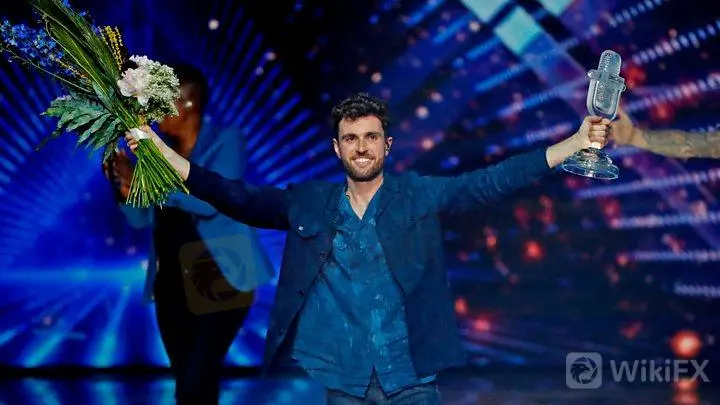简体中文
繁體中文
English
Pусский
日本語
ภาษาไทย
Tiếng Việt
Bahasa Indonesia
Español
हिन्दी
Filippiiniläinen
Français
Deutsch
Português
Türkçe
한국어
العربية
Eurovision 2019: Netherlands wins song contest
Abstract:Media playback is unsupported on your device Media captionThe contest's highlights - from singing

Media playback is unsupported on your device
Media captionThe contest's highlights - from singing in the shower and bendy poles to the Netherland's triumph.
The Netherlands' Duncan Laurence has won the 2019 Eurovision Song Contest with his song Arcade.
He had been the bookmakers' favourite to win, and came through to the top of the leaderboard with 492 points after the public vote.
The UK's Michael Rice came bottom, after getting just three points from the public vote, and a total of 16 points for Bigger Than Us.
Laurence said: “Here's to dreaming big, this is to music first, always.”
The last time The Netherlands won was 1975. The audience joined in as Laurence performed the track again at the end of the show.
Italy finished second with 465 and Russia third with 369 points.
The ceremony also saw last year's winner Netta perform, while singers from previous contests also sang each other's songs.
Image copyrightGetty ImagesImage caption Conchita Wurst, Mans Zelmerlow, Gali Atari, Eleni Foureira and Vjerka Serdjucka sang each other's songsImage copyrightGetty Images
Madonna also performed just before the voting results were announced. She kicked off her set with a version of Like A Prayer, with backing dancers dressed as monks.
She went on to sing Future, her new single featuring the rapper Quavo.

Media playback is unsupported on your device
Media caption'Boring' winner...? 'Incredible atmosphere'? Fans in the arena share their views
Her performance was felt by some, to be a little, well, flat.
“A slightly muted response to Madonna there,” said BBC One's commentator Graham Norton.
Skip Twitter post by @maitlis
Have to say Michael rice performsnce was substantially better than Madonnas tonight. Not many people can say that. #BBCEurovision #eurovision
— emily m (@maitlis) May 18, 2019
Report
End of Twitter post by @maitlis
Capital Breakfast presenter Roman Kemp was also unimpressed, calling for autotune to come to the rescue.
A section of her performance in which her backing dancers displayed Israeli and Palestinian flags was not an approved part of the act, organisers said.
Eurovision said: In the live broadcast of the Eurovision Song Contest Grand Final, two of Madonna's dancers briefly displayed the Israeli and Palestinian flags on the back of their outfits.
“This element of the performance was not part of the rehearsals which had been cleared with the EBU and the host broadcaster, KAN. The Eurovision Song Contest is a non-political event and Madonna had been made aware of this.”
It wasn't just the Queen of Pop who was apparently breaking the rules either.
The organisers said Iceland's Eurovision act could face punishment after displaying Palestinian flags during the live broadcast.
During the final, the band members held up Palestinian flags while their public vote was being announced.
In a statement, Eurovision said the “consequences of this action” will be discussed by the contest's executive board.
Alongside the contest, there were clashes in central Jerusalem as ultra-orthodox Jews protested against Eurovision.

Media playback is unsupported on your device
Media captionUltra-orthodox Jews in Jerusalem are angry that the contest was scheduled on the Jewish Sabbath
They objected to the scheduling of the Eurovision Song Contest on the Jewish Sabbath, resulting in angry scenes as demonstrators clashed with police.
At one point, a small number of women held a counter protest, showing their bras.
There were other protests in Tel Aviv over Israel's occupation of the West Bank, East Jerusalem and the Golan Heights.
Image copyrightGetty Images
There have also been campaigns online.
The Palestinian Campaign for the Academic and Cultural Boycott of Israel (PACBI) has been using social media to oppose holding the contest in Israel because of its treatment of Palestinians.
It accuses Israel of trying to whitewash (“artwash”) discrimination, which it likens to apartheid, the system of racial segregation once used in South Africa.
Follow us on Facebook, on Twitter @BBCNewsEnts, or on Instagram at bbcnewsents. If you have a story suggestion email entertainment.news@bbc.co.uk
Disclaimer:
The views in this article only represent the author's personal views, and do not constitute investment advice on this platform. This platform does not guarantee the accuracy, completeness and timeliness of the information in the article, and will not be liable for any loss caused by the use of or reliance on the information in the article.
WikiFX Broker
Latest News
Pepperstone Sponsored the "Aston Martin Aramco Formula One Team"
SQUARED FINANCIAL: Your Friend or Foe?
Big News! UK 30-Year Bond Yields Soar to 25-Year High!
ACY Securities Integrates MetaTrader 5 to Enhnace Copy Trading Service
Soegee Futures Review: Should You Trust This Broker?
Malaysian Pilot Loses RM1.36 Million in UVKXE Investment App Scam
Indonesia officially joins the BRICS countries
Attention! Goldman Sachs Cuts Gold Target to $2910
Inflation Rebounds: ECB's Big Rate Cut Now Unlikely
Carney \considering\ entering race to replace Canada\s Trudeau
Currency Calculator







